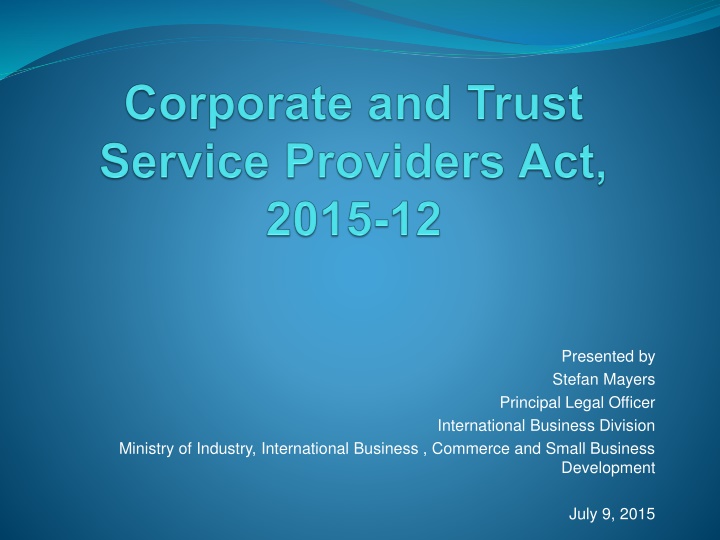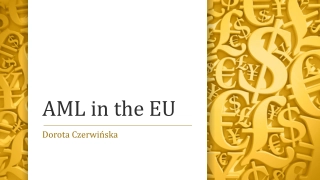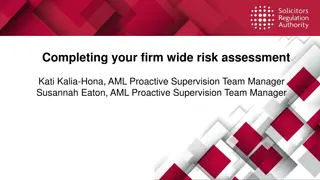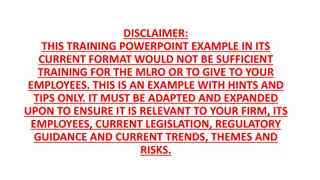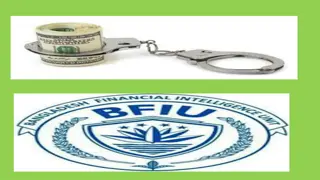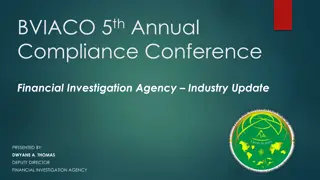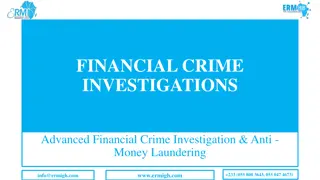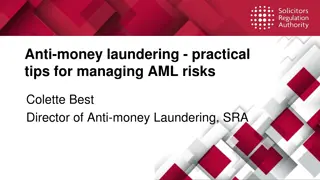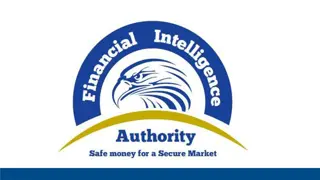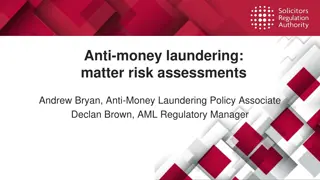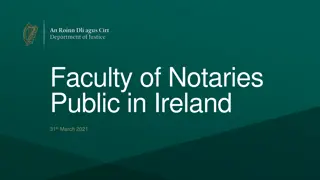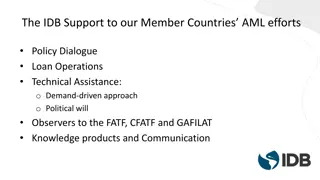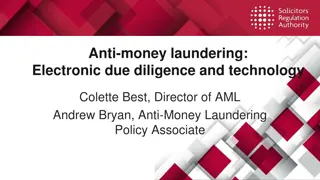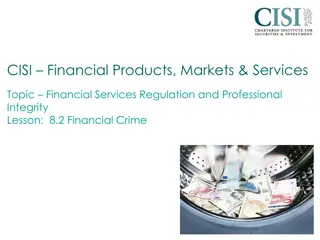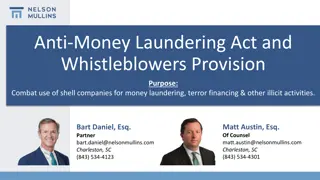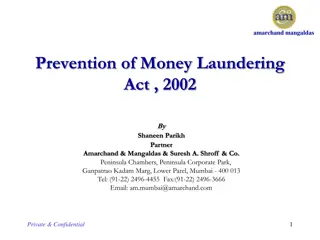Enhanced Anti-Money Laundering and Corporate Regulation Framework
Ministry of Industry, International Business, Commerce, and Small Business Development has implemented new Anti-Money Laundering Guidelines and the Corporate and Trust Service Providers Act to strengthen regulatory frameworks. The guidelines address gaps identified in the previous evaluation and introduce stricter compliance measures, including record-keeping requirements and UBO identification. The CTSPA enhances oversight of service providers, ensuring professionalism and adherence to international standards.
Download Presentation

Please find below an Image/Link to download the presentation.
The content on the website is provided AS IS for your information and personal use only. It may not be sold, licensed, or shared on other websites without obtaining consent from the author.If you encounter any issues during the download, it is possible that the publisher has removed the file from their server.
You are allowed to download the files provided on this website for personal or commercial use, subject to the condition that they are used lawfully. All files are the property of their respective owners.
The content on the website is provided AS IS for your information and personal use only. It may not be sold, licensed, or shared on other websites without obtaining consent from the author.
E N D
Presentation Transcript
Presented by Stefan Mayers Principal Legal Officer International Business Division Ministry of Industry, International Business , Commerce and Small Business Development July 9, 2015
Anti-Money Laundering Guidelines This Ministry published new AML Guidelines in conjunction with the Anti-Money Laundering Authority. The new CTSPA allows for this so that the Guidelines now have the full legal weight of the Act behind them. This will also satisfy CFATF requirements as we prepare for the next round of Mutual Evaluations. After the last Mutual Evaluation there were several holes in our AML regime that urgently needed to be plugged in order to be deemed compliant. This included record keeping requirements, UBO identification, treatment of PEPS and DNFBPs, including Service Providers. Failure to comply with the AML Guidelines carries the same penalties provided for under the AMLFT Act, 2011-23.
Corporate and Trust Service Providers Act Last year the CPC drafted a new Bill which was intended to replace the International Trust and Corporate Service Providers Act, 2011-5 (ICTSPA) (an Act to govern the operation of persons and companies which provide corporate and or Trust services to the International Business sector, proclaimed in Dec 2011). The Corporate and Trust Service Providers Act, 2015 (CTSPA) was recently Proclaimed into law and will be fully implemented before November 1, 2015. The CTSPA removes the International designation so that it captures providers of Services to Foundations, Private Trust Companies and Regular Barbados Companies which are set up as domestic entities, which initially escaped the purview of the previous Act.
CTSPA contd The core functions of the law remain the same and include; That all Corporate and Trust Service Providers be licensed and regulated after satisfying specific criteria to determine whether they are fit and proper to be licensed. That all Corporate and Trust Service Providers operate in an efficient and professional manner towards their clients while minimising risk to the jurisdiction s reputation. That all Corporate and Trust Service Providers comply with international standards for record keeping on clients as well as certain reporting requirements as part of their Anti-money laundering and compliance requirements.
CTSPA contd The legislation empowers the regulator to suspend or revoke a licence for certain breaches as well as provides recourse for an aggrieved party to challenge such punitive action. The information submitted to the Ministry by applicants and imposes penalties for the unauthorised disclosure of such information. legislation also offers protection of
SPECIFIED ENTITIES AND SERVICES UNDER THE CTSPA 2015-12 an international business company; an international society; an international trust ; a foreign sales corporation ; a foundation; a private trust company; and Any entity which either conducts international business and has obtained permission from the Exchange Control Commission
CORPORATE AND TRUST SERVICES Services where the Service Provider: acts as agent for the setting up of a specified entity; provides services as a registered office or acts as an agent for correspondence for the specified entity; prepares by filing, statutory forms, resolutions, returns and notices for any specified entity; acts as, fulfills the function of or arranges for another to act as an officer, director, secretary or as a person in a similar capacity for the company; acts as a shareholder or a quota holder of the specified entity; offers services which involves controlling in whole or part the assets of a specified entity
Who and what the Act regulates The First Schedule lists the types of entities recognised by the Act and the types of services that qualify as Corporate or Trust services. Section 1. (1) (g) refers to an unnamed entity that conducts international business and/or has obtained specific permission from the Central Bank to deal in foreign currency. This refers to any regular domestic company that engages primarily in international business outside of the regulatory regime for international business. Those who provide corporate and trust services, as described under the First Schedule, to these types of domestic companies must also be licensed.
Directors, Officers and Secretaries Under the First Schedule, fulfilling the function of, or arranging for another to act as a Director, Officer or Secretary of a specified entity is listed among the corporate services that would require a license. The IBD has previously stated to stakeholders that it will not require Directors of international companies to be licensed but the IBD reserves the right to request information on proposed Directors.
Directors, Officers and Secretaries cont d Persons fulfilling one of the aforementioned roles within their own specified entity (an employee or owner) will not require a licence to do so. This reflects the current international standard for Corporate Governance and the same provisions were enacted over a decade ago in other international financial centres, such as Malta, the Seychelles, the Isle of Man and the Caymans. However, a licensed Director regime may exist in the future in relation to Mutual Funds regulated by the FSC, where Directors are held to very exacting international standards due to their fiduciary duties.
Exemptions: Entities Institutions Act, Cap.324 (FIA) or the International Financial Services Act, Cap. 325 (IFSA) do not need a licence under the CTSPA 2015-12 in order to provide corporate and trust services as described under the First Schedule. Section 38 of the CTSPA sets out the limitations of this exemption and the powers conferred unto the original regulator (under the FIA or IFSA) by the CTSPA to take disciplinary action against an offending licensee. Only nominee shareholders who provide this service for profit need a licence. already licensed under the Financial
Exemptions contd Those who only provide advice, such as legal, financial and tax advice, to international clients will not require a licence under the CTSPA unless they also perform any of the services listed in the First Schedule. This includes the filing of the listed statutory documents and returns on behalf of specified entities, under Section 2 (2) (c). This includes filings under the Companies Act, Cap.308, the IBC Act, Cap.77, the SRL Act, Cap.318.B, the PTC Act, 2012- 22 and the ITA, Cap. 245. Everyone, including exempted persons, is reminded of their obligations under the Money Laundering and Financing of Terrorism (Prevention and Control) Act, 2011-23.
Exemptions contd Lawyers or law firms that act as company or partnership formation agents for specified entities will require a license under the CTSPA. Lawyers arranging for directors or officers in the context of carrying on the business of the law firm are acting as a Corporate Service Provider and must be licensed. However, simply arranging for a Corporate Service Provider to carry on the activities prescribed in the Act would not require a license under the Act.
Statutory obligations: Sections 11 to 18 impose several obligations on the Service Provider including; Entering into a written contract with the client; Maintaining separate client accounts; Maintaining a professional relationship with clients; Maintaining professional indemnity insurance; Sections 19-24 impose reporting obligations for material changes, legal proceedings, clients ending the contract, the winding up of the SP s business, submitting audited financial statements and retaining client records for at least 6 years.
Draft Forms: The Draft forms create a profile of the applicant Service Provider and help determine whether they are fit and proper to be licensed using the criteria set out in Section 8; Applicants may apply for any one of 3 types of license offered; Applicants for a Trust or Corporate and Trust license must demonstrate competence in the area of Trust administration; Input from the sector will help in completing the forms.
Q & A For further information, please contact: Mr. Kaeron Venner, Director of International Business The Ministry of International Business 7th Floor, Baobab Towers Warrens, St. Michael Tel: 625-2225 Kaeron_Venner@barbadosbusiness.gov.bb
